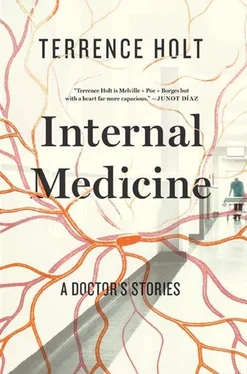As the night settled in more heavily around us — with the familiar call-night sensation of ill impending — you could almost hear the silent plea directed at Hawley’s impassive figure. For a time, it seemed our prayers were heard. The muffled chirping of pagers became sporadic and then fell quiet, and he might have been asleep. He sat motionless in the glow of the lamp, eyes closed, facial features arrested by the light, waxen in their various droops and sags.
We had seen this before: he had an uncanny knack for sitting still like this, only to break out without warning in some interminable yarn that would not stop until it had reached its farcically implausible conclusion. He was not above claiming personal experience with spontaneous combustion. But on this unusual night as the stillness deepened it seemed possible to hope that, this once, we might be spared. We knew better, of course.
So when the old man straightened in his chair we felt both doomed and affirmed in our pessimism. He resettled his flabby white hands in his lap (hands faultlessly clean, the nails as well tended as a funeral-parlor cadaver’s), and cleared his throat. Benson, the sleeping anesthetist, rolled over and moaned in a dream two words that might have been “not again.”
“I knew a man,” Hawley began, the formula with which most of his stories began, as immediately recognizable as “once upon a time” (and, some said, with as much relation to reality). Then, equally part of the ritual, a long pause ensued, during which Hawley could be seen to settle into himself, into whatever trance these stories of his put him into, which enabled him to go on talking in the face of any amount of indifference or contempt.
When he found his voice again, it had taken on a low, almost monotone quality. People claimed that he could speak, when he had started going at this pitch, without moving his lips, and this was what allowed him to go on at such length. Indeed on this night I had the opportunity of watching him closely, and it did seem as if the voice emerged without any movement of his face, his features lying as impassive in the lamplight as shadows on the face of the moon.
“I knew a man,” he said again, seeming to have rediscovered the sentence’s original direction, “who had a most unhealthy relationship with hope.”
A groan made its way around the room, followed by Hawley’s bland gaze. He might have been a blind man, for all the expression it held. It came to rest, blindly, benignly, on Benson. “Do you think he’s sleeping?” he asked, then turned away, the question clearly of no interest, one of those mysterious flourishes that clogged up all his tales, seeming to insinuate something but in reality only inane.
“His name was — let’s call him Schott. If anybody ever needed to be Schott, it would have been him. You wouldn’t remember him: this all happened a long time ago. I wasn’t more than a year or two out of residency. I had come back from Cambridge an apostle of light, ministering in this forsaken wilderness.”
He gurgled briefly in what must have been a laugh.
“If there’s anything to be said for practicing in the place where you grew up, it’s that people will hold you to a certain standard of honesty. A part of that standard requires that you stay pretty much the person you’ve always been. In going away and coming back a doctor, I’d pushed that clause to the limit; coming back as an apostle of light just wasn’t on the cards.
“But strangers were another matter, which is how this man Schott came on the scene. He had a German name, which is nothing remarkable in these parts. But he also had a German accent, and a medical degree from the University of Göttingen, where he had also completed a residency in internal medicine, followed by a three-year research fellowship at Hopkins, in oncology.
“Why a man with that background would wind up in a backwater such as this was a question no one worried about: he was a foreigner, and that was reason enough. And besides, having an oncologist in the first place was something of a coup, the field being still in its infancy. The German accent was more of an asset than not, even though this was at a time when German still meant, for most people, Nazi. But the University of Göttingen! And the research. I think the Chamber of Commerce believed he was going to single-handedly start up some kind of institute. You actually heard people talking about the Mayo. People thought that way then.
“Schott arrived the year after I did. I didn’t meet him for two or three months. Hardly anyone did. Too busy with his research was everybody’s understanding, so no one resented it.
“He also had a pretty busy practice. This was back in the day when things like childhood leukemia were nothing but a death sentence. It was hard to believe that people like Schott thought they could treat it. Everyone knew you could induce remission in ALL with amethopterin, but not many people thought it was a good idea: the disease was fatal, the remissions were brief, why not let the kids die in peace? This was before Holland et al. turned the thing around. Our frame of reference had more to do with the early work on nitrogen mustards: back then you knew, if you knew anything, that the initial discoveries came out of autopsies done on victims of gas attacks in the War. So it wasn’t anything you wanted to get close to. It just had a bad aroma about it.
“In retrospect, it’s amazing Schott had the nerve to get anywhere near it, what with his accent and his German degree. I think he was just tone-deaf to the whole issue. So was I, for that matter, once I discovered that I needed Schott and his German science.
“The case that brought us into contact was one of those things that happens only rarely in pediatrics, but they can make you reconsider the whole thing. A five-year-old boy, brought in by his mother for fatigue, listlessness, the whole spectrum of vague complaints that can be anything from maternal anxiety to — something bad. Which this was. The physical exam told me everything I needed to know: tachycardia, pallor, and a spleen I could feel halfway down to the pelvic brim. I patted the little fellow on the head, told his mother we would need to draw some blood, and scheduled them to come back the next day, when I was going to tell her that her child had leukemia and was going to die.
“There was no getting away from it. I was going to have to talk to that woman tomorrow, and then over the next few weeks I was going to watch that child die gasping for breath. Thinking about it, I wandered into the corridor and stood looking out the window at the parking lot.
“I didn’t know for half a minute that anyone was with me until I heard a voice at my ear, soft, the accent giving it an insinuating quality that always grated on me.
“ ‘You must have something on your mind,’ it said.
“I jumped, and turned, and found myself face-to-face with Schott. He had an oddly small face, the features jammed together as though from a lifetime of looking through keyholes. His eyes had a vague, watery quality that made him look as though he ought to be wearing glasses. He nodded at the view through the window and said, ‘I come here, too, myself, when it is time to think.’
“In my surprise at this sudden appearance, even more so at his peculiar insight into my inner turmoil, I leapt perhaps a little too eagerly at the coincidence of this man’s appearance at that particular moment.
“ ‘You’re just the man I need to see,’ I heard myself cry out, and laid before him the outline of the case.
“Schott listened to my story, nodding and pulling at his lower lip, his face mirroring my own concern. When I was done that lip curled up in a smile that made his eyes focus happily off in the distance: it gave his expression a wistfulness I hadn’t expected from a German scientist, and it made me like him suddenly. ‘I can help,’ he said, and that made me like him even more.
Читать дальше












